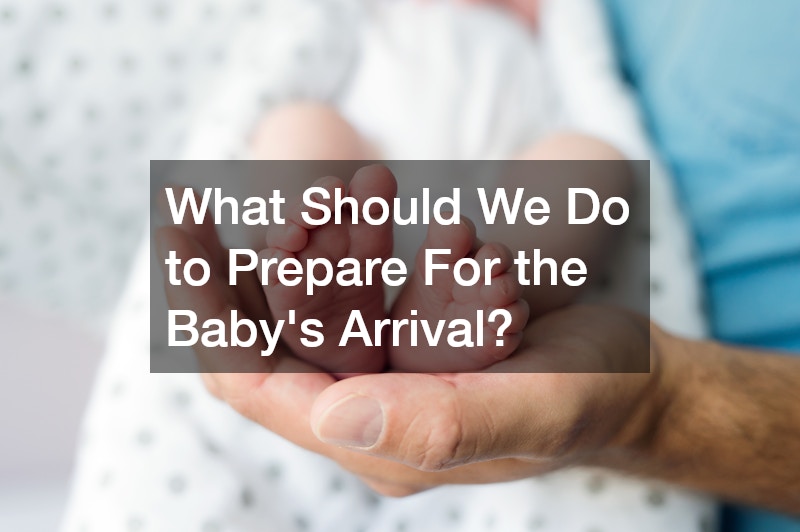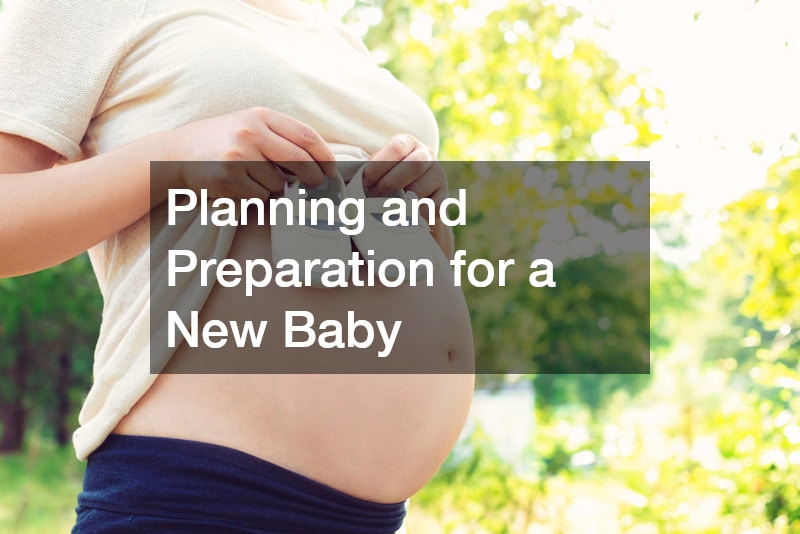Welcoming a new baby into the family is an exciting yet overwhelming experience, filled with joy, anticipation, and numerous decisions. Careful planning and preparation can ensure that this life-changing journey goes as smoothly as possible. From setting up a nursery to selecting the right healthcare provider, every decision plays a crucial role in creating a safe, supportive environment for your baby. This guide will take you through the key aspects of planning and preparation for the arrival of your newborn, offering valuable insights to help you navigate the months ahead with confidence and peace of mind, while also managing the inevitable surprises along the way. By establishing routines, building a support network, and understanding what to expect, you’ll be better prepared to adapt to the various stages of parenthood, ensuring that both you and your baby thrive. Thoughtful planning now can help you feel more grounded, organized, and ready to embrace all the joys and challenges that come with welcoming a new life into your home.
1. What Should We Do to Prepare for the Baby’s Arrival?

Effective planning and preparation for a baby’s arrival can ease your transition into parenthood. It involves taking care of essential medical tasks, preparing your home, and considering your financial situation.
Initial Medical Check-ups and Tests
Before the baby arrives, ensuring that you are up to date with your medical check-ups and tests is vital. Regular prenatal visits allow for proper monitoring of the baby’s growth and the mother’s health, helping catch any potential issues early. Blood tests, ultrasounds, and glucose screenings are just a few of the essential medical evaluations that parents-to-be should plan for.
Creating a Birth Plan
Creating a birth plan is another important step in planning and preparation for your baby. It outlines your preferences for labor, delivery, and postpartum care. You can discuss your preferred delivery location, pain management options, and post-birth practices with your healthcare provider.
Setting Up the Nursery
One of the most exciting aspects of planning and preparation is setting up the nursery. From choosing the crib to selecting a soothing color palette, the nursery should be a safe, peaceful space for your baby. Installing safety features such as fences and gates is important to ensure the nursery and home are baby-proofed.
Budgeting for Baby Expenses
Planning for a baby also requires financial preparation. Costs can add up quickly with hospital bills, baby supplies, and other expenses. Developing a comprehensive budget that accounts for medical care, nursery set-up, and future childcare needs is an important step in planning and preparation.
Establishing a Support System
Finally, ensuring that you have a strong support system in place is crucial. Whether it’s a partner, family, friends, or community groups, knowing who you can rely on for emotional, physical, and logistical support is essential.
2. How Can We Plan for Parental Leave?
Planning and preparation for parental leave is an essential step to ensure you have enough time to bond with your newborn and recover from childbirth.
Understanding Parental Leave Policies
Start by researching your company’s parental leave policies. Many countries and organizations offer maternity, paternity, or parental leave benefits. It’s vital to know the details of these policies as part of your planning and preparation.
Communicating with Your Employer
Once you’ve reviewed your parental leave options, communicate with your employer about your plans. This conversation should happen early in the pregnancy to ensure your workplace can plan for your absence.
Financial Planning for Leave
During your parental leave, your income may be reduced, so financial planning is critical. Setting aside savings to cover costs during this period will help you focus on caring for your newborn without financial stress.
Organizing Childcare Post-Leave
As you near the end of your leave, planning for childcare is crucial. Whether you decide on family care, a daycare center, or a nanny, it’s important to finalize these details ahead of time as part of your planning and preparation.
Creating a Work Coverage Plan
Collaborating with your employer to create a work coverage plan is another essential part of preparation. By planning who will take over your responsibilities while you are away, you can help ensure a smooth transition for both you and your employer.
3. What Steps Should We Take for a Healthy Pregnancy?
Planning and preparation for a healthy pregnancy can lead to positive outcomes for both you and your baby. Here are some essential steps:
Prenatal Nutrition and Supplements
Proper nutrition is essential during pregnancy. Be sure to eat a balanced diet rich in fruits, vegetables, and lean proteins, and consult your healthcare provider about prenatal vitamins.
Regular Exercise and Fitness
Moderate exercise during pregnancy helps keep you healthy and can prepare your body for labor. Consult your doctor before starting any new exercise routine as part of your planning and preparation.
Monitoring Baby’s Development
Tracking your baby’s development through regular ultrasounds and check-ups is essential for planning and preparation. These appointments allow your healthcare provider to monitor growth and detect any issues early.
Managing Pregnancy Symptoms
From morning sickness to backaches, pregnancy symptoms vary. Preparing to manage these symptoms with appropriate care, medication, or lifestyle changes can make the journey smoother.
Mental Health and Well-being
Mental health is just as important as physical health. Including self-care and emotional support in your planning and preparation is essential for maintaining balance during pregnancy.
4. How Do We Choose the Right Healthcare Provider?

Choosing the right healthcare provider is a critical part of your planning and preparation for childbirth. It is best to select a provider that you connect with, and who makes you feel comfortable.
Researching Healthcare Options
From pediatric urgent care centers to local pediatricians, researching various healthcare options can help you choose the right provider for your baby’s ongoing care. It’s also wise to select a dentist early, as oral care will become important in the toddler years.
Making a Decision: OB-GYN, Midwife, or Doula?
Consider whether you want an OB-GYN, midwife, or doula to support your birth. Each has different qualifications and offers varying levels of care during pregnancy and delivery.
Evaluating Hospital vs. Home Birth
Part of planning and preparation is deciding where you will give birth. A hospital may be the safest option for high-risk pregnancies, while home births with a trained professional may appeal to those seeking a more intimate experience.
Discussing Birth Preferences
Make sure to discuss your birth preferences with your chosen healthcare provider. Whether it’s about pain relief options or birthing positions, clear communication is essential.
Building a Relationship with Your Provider
Developing a trusting relationship with your healthcare provider is essential. Regular appointments and open communication will help you feel more prepared and supported.
5. What Should We Include in Our Hospital Bag?
Packing a hospital bag is an important aspect of planning and preparation for the big day.
Essentials for Mom, Baby, and Partner
Items like comfortable clothing, toiletries, and nursing bras are must-haves for mothers. Pack newborn clothes, blankets, and diapers. A car seat is also essential to bring your baby home safely. Don’t forget to pack essentials for your partner, such as snacks, comfortable clothes, and toiletries.
Important Documents and Contacts
Be sure to include your insurance information, birth plan, and important contact numbers in your hospital bag.
Comfort Items and Entertainment
Many parents like to bring comfort items, such as pillows or music, to make their stay more relaxing. Entertainment, such as books or a tablet, can help pass the time during labor.
6. How Can We Prepare Our Home for the New Baby?
Planning and preparation to make your home safe and welcoming for your baby is vital.
Explaining the Arrival in Age-Appropriate Ways
If you have older children, preparing them for the new baby is important. Use age-appropriate language to explain the arrival of their sibling.
Encouraging Involvement and Responsibility
Encourage your children to get involved in preparing for the baby. Assign small responsibilities to help them feel included.
Managing Sibling Jealousy and Behavior
Sibling rivalry is common. Planning for one-on-one time with your older children can help prevent feelings of jealousy.
Planning Activities for Older Siblings
Ensure you have activities planned for older siblings to keep them entertained during the early days with the newborn.
Ensuring One-on-One Time with Parents
It’s essential to balance your time with all your children. Set aside dedicated time with each child to make them feel special.
7. What are the Must-Have Baby Supplies?

No planning and preparation are complete without gathering baby supplies. Here are the essentials:
Essential Clothing, Linens, Furniture and Accessories
Stock up on soft, comfortable baby clothes, swaddles, and linens. Cribs, changing tables, and rocking chairs are nursery essentials for a smooth transition into newborn life. Don’t forget baby monitors for added peace of mind. Diapers, wipes, and diaper creams are crucial. Consider stocking up on different sizes.
Feeding Supplies and Equipment
Whether you plan to breastfeed or use formula, ensure you have the necessary feeding supplies, such as bottles and nursing pillows.
Health and Safety Equipment
Babyproofing your home with gates and safety locks is essential. Don’t forget to include baby health items like a thermometer and first-aid kit.
8. How Do We Establish a New Routine Post-Birth?
Establishing a routine is essential in planning and preparation for life after the baby’s arrival.
Adjusting Sleep Patterns and Feeding Schedules
Sleep will be sporadic with a newborn. Planning for naps and night feedings is critical to balancing rest. Create a flexible feeding schedule that accommodates your baby’s needs, whether breastfeeding or formula feeding.
Balancing Parenting Duties
Work with your partner to divide parenting duties. Clear communication will help prevent burnout. Taking time for self-care is critical in the early days. Plan for rest and recovery as part of your daily routine.
Flexible vs. Rigid Routines
Newborns can be unpredictable, so keeping a flexible routine allows you to adapt to your baby’s needs.
9. What Should We Know About Baby’s First Days at Home?
The first days at home are exciting but can also be challenging. Planning and preparation can help ease this transition.
Keeping the Baby Safe and Comfortable
Ensure the baby’s sleeping area is safe, and remember to monitor their temperature and comfort levels regularly. Ensure any animals who are in the house know how to appropriately behave around the new born. Dog trainers can be a great investment before introducing your pet your new baby.
Recognizing Newborn Needs and Cues
Learning your baby’s cues for hunger, sleep, or discomfort will come with time. Be patient and stay observant.
Managing Visitors and Social Expectations
While friends and family may want to visit, limit guests if you need more time to settle into a routine. New moms are often showered with gifts, just because flowers, and plenty of support. This can feel overwhelming.
Scheduling Initial Pediatrician Visits
One of your first tasks after birth will be scheduling a visit with your local pediatrician to ensure your baby is healthy and developing well. Welcoming a new baby changes family dynamics. Be prepared to embrace these changes and work together as a family unit.
10. How Do We Adapt Our Home for Long-Term Parenting?

Planning and preparation for long-term parenting requires adapting your home and lifestyle for your growing family.
Setting Health and Education Milestones
Ensure your home fosters growth by focusing on educational building blocks, like creating a reading corner or installing a learning space.
Financial Planning for the Future
Planning for future expenses like education or healthcare is crucial. Consider saving early to prepare for life’s larger expenses. Teaching your children your values and cultural traditions can start early and evolve as they grow.
Flexible Parenting Strategies
Being adaptable as a parent is key. Each child will have different needs and temperaments, so staying flexible will help you thrive. Having a kid-friendly home is crucial to adaptability. Many families consider setting aside a dedicated playroom or even consider a basement remodel to ensure your children have space to play.
Preparing for Life’s Unexpected Challenges
Challenges, like medical emergencies or changes in circumstances, can arise. To prepare your yard to have little ones running around, have a plan for tick removal.
Some families prefer artificial lawn installation to ensure a safe outdoor playing experience for children and to encourage them to get outside.
Planning and preparation for the arrival of a new baby can make a world of difference to integrate your baby seamlessly into your everyday life. From setting up your home to establishing a strong support system, these steps will help ensure that you and your baby have the best possible start. The time and effort invested in planning and preparation will create a nurturing, joyful environment where your family can thrive.

